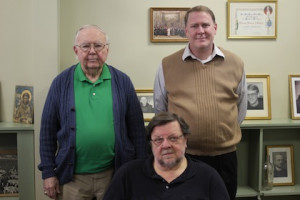
The Associated Press
Ask a Franciscan what he thinks about Jesuits and you’re likely to get a snide remark or an eye roll before a real answer. “We always say that the Franciscans and Jesuits are friendly enemies,” said Brother Campion Lally, 76, a member of the Franciscan Guild in Brooklyn Heights, down the street from St. Francis College. And that is why it is so interesting that the new Pope, former Cardinal Jorge Borgoglio, a Jesuit, chose to adopt the name Francis for his papacy.
Pope Francis emerged from the balcony of St. Peter’s Basilica last month without the formal red sash and red shoes that usually accompany the white papal vestments, and he asked the massive congregation to bless him before he blessed them. Both gestures shun the tradition of majesty that come with the role. In his speeches, he also refers to the cardinals as “brothers” rather than the traditional “lords.” He has been living in a modest hotel room inside Vatican City, politely refusing the lavish papal apartment.
The Pope celebrated Easter Mass this past Sunday unaccompanied by his cardinals, and again wore simple white robes. Afterward, he rode in a “popemobile” without bulletproof glass so that he could embrace people in the streets. This is much more significant than many outside the church infrastructure may realize. Francis is redefining how a pope can live. The selection of Pope Francis, and his actions since then, have filled many Franciscans in Brooklyn with a mixture of pride and hope that his leadership will usher in a new era for the Roman Catholic Church.
“He doesn’t seem to be focusing on power,” said Brother Edward Wesley, 68. “Is that a change? It’s a revolution!”
On a recent afternoon, the Franciscan brothers at the guild discussed that revolution, and how it is embodied in the Pope’s Jesuit roots and his admiration for Franciscan ideals.
The two orders of the Catholic Church are profoundly different. St. Francis of Assisi began his order in the 13th century as a reaction to Italy’s urban poor, a new social class that went ignored by governments and the church. St. Ignatius of Loyola was a Spanish soldier who founded the Jesuit order in the 16th century during the Counter-Reformation, Catholicism’s response to the emergence of Protestantism. Franciscans dedicate themselves to poverty and informality, while Jesuits dedicate themselves to knowledge and structure. There is an old, lighthearted saying that Franciscans are the heart of the church and Jesuits the brains.
Brother Lally predicts that Pope Francis will find a balance between Franciscan and Jesuit ideals, between compassion and sternness, and that the Church will benefit from it. “I can see that he will be more among the people, probably,” he said, citing Francis’ history in Argentina as archbishop and then cardinal. And “his Jesuit upbringing will help him to clean house in the Curia,” said Brother Lally.

The Curia is the governing body of the church and has not only suffered recent criticism for its dealing with the sex-abuse scandals, but for corruption in the Vatican Bank. Pope Benedict XVI resigned last month because he felt he was no longer fit to serve, and thus, as many speculated, capable of fixing these deeply rooted problems.
Some Catholics wondered about the Jesuit cardinal’s choice to honor St. Francis. Brother Wesley believes it is a clear dedication to bringing the church back to its roots. St. Francis’ dedication to poverty was an attempt to mimic the life of Jesus. “St. Francis brought the Gospel to the people,” he said.
Francis is the first pope from Latin America, which also plays into his name selection. “There’s a preferential option for the poor that South America takes a lot more seriously than the rest of the world,” said Brother Wesley.
Both influences on Pope Francis—his Jesuit order and the Franciscan ideals he lives by—are likely to shape Francis’s papacy, say the Franciscans in Brooklyn. “I like his recent history as a cardinal,” said Brother Geoffrey Clement, 48. “He’s a fully functioning person.” Pope Francis shunned the privileges of being a cardinal and used public transportation, cooked his own meals and lived in a small apartment while he was a cardinal in Argentina, At the same time, Pope Francis, formerly Cardinal Bergoglio, has not been interested in the honorary perks that come with climbing up church hierarchy, consistent with the philosophy of his religious order, the Jesuits.
In fact, the Jesuits swear an oath to never strive to be promoted to (or even accept) a position outside the Society of Jesus, unless ordered to do so by a superior in the church. Brother Clement thinks that being part of a religious order has allowed Francis to have a strong “communal sense of the church.”
Some church observers have expressed disappointment with indications that the pope will not bring about hugely liberal changes to Catholicism, such as allowing clergy to marry, ordaining women priests, condoning contraception or even accepting gay marriage. But the Brooklyn Franciscan brothers don’t seem too bothered because they believe that the church’s main priority is to first get itself in order. All three reserve concrete assessments of Francis so early in the new papacy, but they have hope that he can bring some respectability back to the Vatican.
“You can’t really just go back to the way it was,” said Brother Lally. “He’s got to make a lot of changes.”
Brother Wesley noted that Americans especially think that institutions should be more transparent. “And I personally would like to see more transparency in the Vatican,” he said.
Pope Francis’s abandonment of tradition during his first weeks is a hopeful sign for change, say the brothers. Pope Francis is not just speaking to the Curia in his first moments as leader of the Roman Catholic Church, said Brother Clement, but is making “a statement to the world.”

Leave a Reply